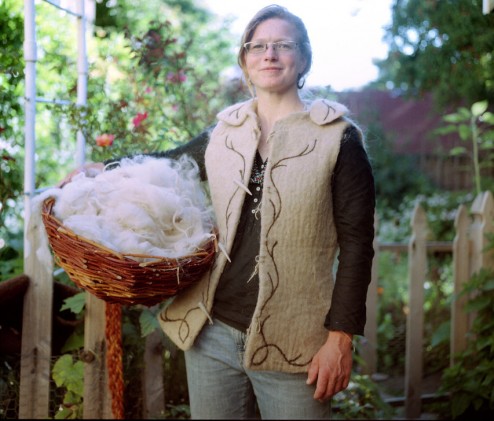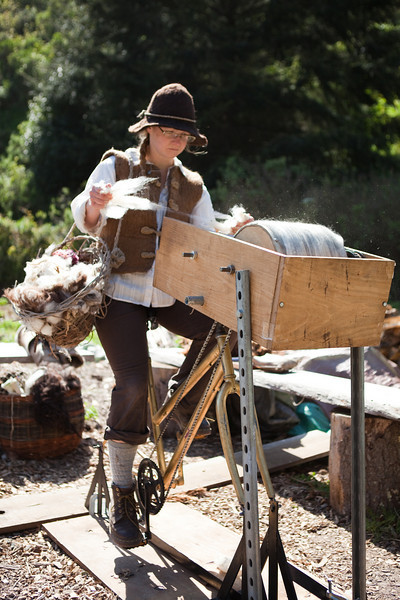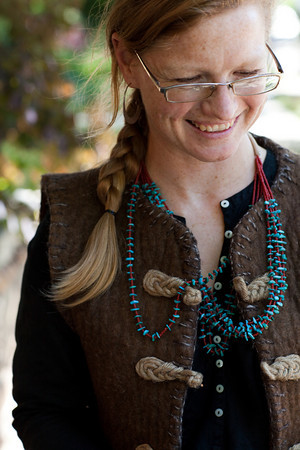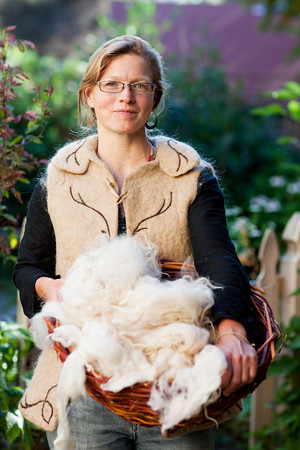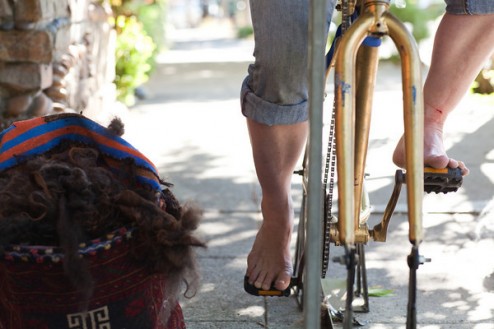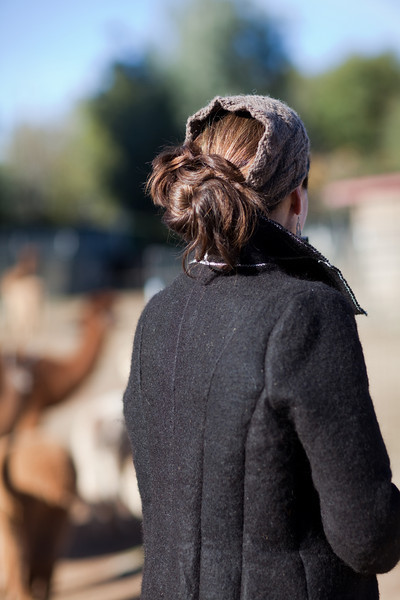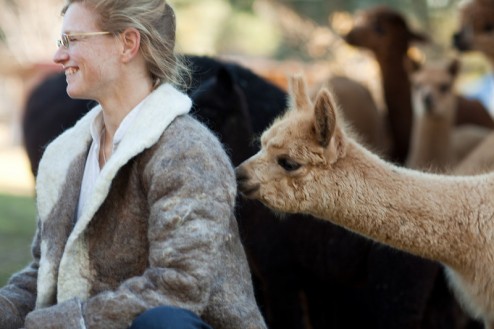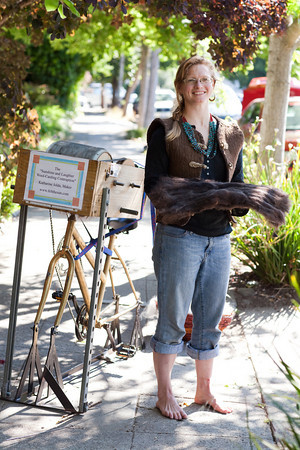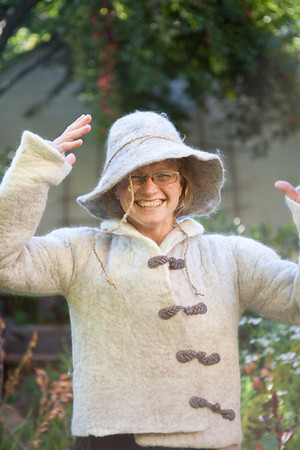Born of water, wool, soap and human hands– felt is the most immediate textile that can be created from the back of a sheep. The directness of the process, and utility of the finished product has found its way deep into the heart and soul of our kindred featured artisan, Katherine Jolda, a woman whose creative life has manifested fundamentally crucial garments for the 150 mile wardrobe. She has been deemed ‘a brilliant inventor, natural philosopher, and felt athlete,’ by those who have both observed and worn her work.
Jolda’s sensibility-for-utility was honed during her six year sojourn on the Navajo reservation, a region she gravitated to and made her home after college. Her initial work focused on food system and public health issues. “I was re-invigorating the work of growing food, and eating that which we grew. It was a diabetes intervention strategy,” she recounted during one of our first meetings.
During this time on the reservation, Jolda’s interest was peaked by the Navajos’ flocks of churro sheep. “The sheep are living symbols of the good life, in fact, the sheep = life.” The Navajo don’t appreciate numerous questions regarding their cultural practices–to become involved with the sheep, meant ‘doing’ versus ‘taliking.’ Jolda’s athleticism, and ‘can-do’ way of being fit right into this cultural paradigm.
The remoteness of the Navajo Nation, combined with ongoing water rights issues spawned by foreign mining entities, stimulated the residents including Jolda, to manage their resources with an intricate efficiency. “You can’t drive elsewhere to acquire things… for instance, you don’t buy feed for your sheep, the flock relies on the surrounding pastures completely. This makes ground water extraordinarily precious to the people, and makes the use of it for mining coal all the more irresponsible.” she said during a recent presentation on the subject.
Jolda’s felting process is representative of her years of participation with a culture that has for reasons of necessity, lived within its ecological confines.
Returning home and to the city of her birth in the last 24 months, Jolda has begun the process of weaving together the culture of her Oakland roots, with the strong impressions and lifestyle shifts she made while living with the Navajo people.
She has brought her earth-based practicality to the city where she now resides, “I was curious how my (felting) practice would manifest itself in my homeland, this region, that I had primarily known to be urban and metropolitan. I was delighted to find not only people similarly engaged in the teaching and learning of fiber arts, but the passionate application of these skills and relationships to common political and economic concerns, such as ecological health, global environmental justice, manufacturing and trade policies, livelihood, and social relationships.”
Jolda is actively engaged in an ongoing process of teaching and learning– her contributions to the Fibershed project reflect that cycle. From teaching one of our artisan re-skilling days, to the felting of some magnificent ready to wear garments, she has shared her talents graciously with the entire community.
“I am interested in offering my unique gifts and strengths in ways I enjoyed before my mind got clouded with notions of what I ought to be doing. Intertwined with this is giving others the courage to cultivate and offer themselves similarly. I seek more opportunities to work with young people, as their worldview is developing, I intend to help people connect to deeper cycles.” Jolda teaches felting classes throughout the region and beyond, and is working towards becoming a credentialed teacher. Jolda’s wool processing classes always include the presence and operation of her most re-known invention– the Cyclocarder™.
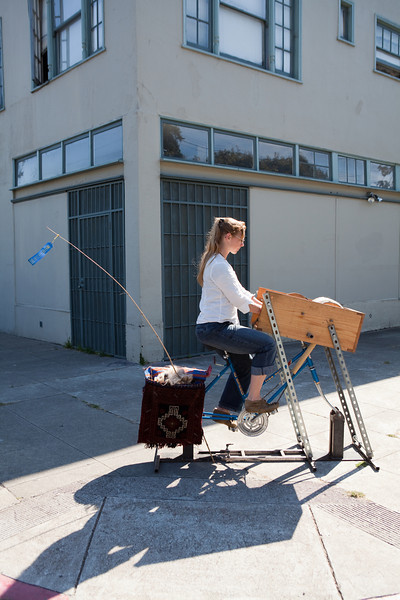
The Cyclocarder is the key to processing Jolda’s fiber once it is shorn from the sheep and after it is washed. Combing wool is the first step in the life cycle of any wool garment whether it is felted, knit, or woven. Jolda’s work approaches wool processing in a revolutionary manner– relying on human-power, while remaining efficient. The standard tools for cottage industry work prior to Katherine’s invention relied fully on hand-cards and hand-powered drum cards. For a felter working to make full size garments– these tools are slow and cumbersome. The bicycle powered drum carder creates on average 6oz. of combed wool in 4-5 minutes.
Jolda’ s interest is to see a cultural shift towards 100% natural fiber garments. ” I would like to see the current trend towards plastic-based outdoor gear transition into a renewable fiber base.” With tens of thousands of pounds of wool being discarded annually in our Fibershed– along with the recent research published on the effects of our plastic clothing on our oceans, Jolda’s work is very timely.
“My main goal is to stop wool from ending up in the compost pile, at least as long as we are wearing clothing from synthetic and industrial materials. All forms of life offer gifts to us humans that match our needs and desires. I want to make durable and beautiful felt items in which the origins of all materials are unmistakable, and help represent the story of our land, wild and cultivated.”
Jolda has brought the story of our region’s fiber to the forefront with her designs. She has engaged with several of the regions farmers to collaborate on her creations.
The first piece Jolda made from our region’s wool was a fedora– an incredibly useful and beautiful tool for shading the face. The wool came from just 44 miles north of Jolda’s Oakland hub, from the Bodega Pastures sheep. The band used to tighten the hat is made from Jolda’s brain-tanned buckskin.
Jolda’s most recent creation is a perfect fusion of beauty and function. Utilized daily for just about everything– food, laptop, wallet, keys– this bag is well constructed from one pound of Bodega Pastures wool, bound together with locally tanned leather straps, sewn into the fiber with brain tanned buckskin. This bag is a complete hit, and a popular item in the Fibershed Marketplace!
This 147 mile winter coat was Jolda’s first and flawless attempt at felting alpaca, her felted pieces were then composed and sewn by Mali Mrozinski for this gorgeous piece that provided warmth and comfort through a long winter.
Katherine’s experiences traveling through the Fibershed have brought her closer to the resources of her home land. “I believe that there is a whole lot of insight revealed when we tell the story of how an item came into being. We always have a feeling about what we are telling others, if it is something we are excited and delighted to tell, or something we feel bad about telling, and that feeling can guide us to become involved in the story, and work so that it becomes something we are delighted to tell.”
Jolda has inspired many within the Fibershed and beyond this year to become active authors of their own fiber stories, by giving us the vision and tools to become our own creators…. more specifically, to become our own ‘mini-wool mill.’ Her inventiveness was born of necessity, and is now being assimilated and incorporated into a community that for all its wealth– has little access to equipment and manufacturing. The drum carder is as needed on our farms and studios as it was on the reservation.
It is our hope to empower more communities in towns and cities everywhere to cultivate their own stories of place through the act of creating with what you have.
To meet Katherine in person, and see her inventions and incredible garments you can go to her upcoming events page.
Thank you to Katherine Jolda, Mali Mrozinski, Julie & Ken Rosenfeld, Paige Green, and Bodega Pastures for making this story a reality… your skills are gifts to our community.

